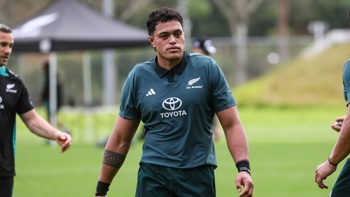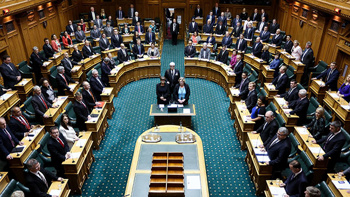Auckland will move to alert level 1 at midnight tonight, Prime Minister Jacinda Ardern has announced.
Masks will continue to be mandatory on public transport around New Zealand.
Uber and taxi drivers will have to wear masks while their passengers will be encouraged to wear one.
Bus drivers will not be asked to require their passengers to wear masks but can encourage them if they wish.
Children under 12 are exempt and masks can be removed for food and drink.
Ardern said she wants to make face masks "part of normal life".
"In terms of the Covid Tracer app - please use it," the PM said.
Ardern said using it would help prevent an outbreak spread.
Staying at level 1 required all New Zealanders to be vigilant and continue playing their part, she said.
The decisions come after 72,000 tests since last Sunday, with all eight community cases being linked and all their close contacts testing negative.
- Auckland to move to alert level 1 at midnight - what you need to know
- One new community case linked to Auckland outbreak, person in isolation
Arden said the outbreak was a "stark reminder" Covid was still with us.
On the country's Covid-19 vaccine rollout, Ardern said they expected all frontline border workers to be vaccinated within the next two to three weeks.
There is still no confirmation of the source of the outbreak. All the theories remained "unlikely" but that didn't prevent health chief Ashley Bloomfield from recommending a move to alert level 1.
Covid-19 modeller Professor Shaun Hendy said today's announcement would come as a relief for many, after another roller-coaster week.
"The week started with the announcement that there with new community cases with only a weak link to the border, much like the Auckland August cluster did," he said.
"The whole genome sequencing then told us that there was no direct link to any known case at the border, but also that we were dealing with one of the new, more transmissible variants.
"However, a massive test and trace effort quickly contained the relatively small number of secondary cases and gave reassurance that we were not looking at the edges of a much larger cluster like the one we uncovered in August."
Given that the cluster now appeared well contained, and there was no evidence of any larger cluster, it was appropriate that Auckland moved to alert level 1 at midnight.
"This case has shown us that we can't be complacent - Covid will continue to surprise us - but it also shows that when our community is vigilant and our systems are working well that we do have the measure of this virus," Hendy said.
Ardern said talks towards a transtasman travel bubble were still "ongoing".
It would depend on how each country and state reacted to an outbreak and what it would mean for citizens stuck there in those situations.
There was always "a level of unpredictability", she said.
"I am ready and willing to be vaccinated and I absolutely will be," she said when asked.
Ardern said her priority was vaccinating those at the greatest risk before getting her own, but confirmed she would be getting vaccinated publicly. She has a family member who is a frontline border worker who is getting vaccinated.
Ardern said rolling out the vaccination programme across MIQ facilities allowed them to test their systems.
Experts have welcomed the move to roll out mask wearing on public transport.
University of Auckland aerosol chemist Dr Joel Rindelaub said the latest data showed the widespread use of masks could help reduce transmission of the virus - even if the masks themselves weren't 100 per cent effective.
"Wearing masks is particularly important in indoors areas where there is less air ventilation compared to outdoors. In fact, most super spreader events have happened in indoor environments," Rindelaub said.
"Thus, wearing masks is a very useful tool in places like public transport, where a small enclosed space with minimal air flow allows for the transfer of tiny aerosol droplets between passengers."
He added that proper masking - and remembering to cover the nose - was also important.
"Since the nasal cavity has many sites where we know the coronavirus likes to attack, it may be a key area for infection and it could be related to loss of smell and taste that so many Covid-19 patients experience."
Otago University epidemiologist Professor Nick Wilson backed the decision to move Auckland to alert level one, given the amount of testing that had now been carried out.
But he said it was "disappointing" that the source of the incursion hadn't been found, and might never be.
"It's good, at least, that the Government has leveraged this opportunity to get mask-wearing established on public transport across the country, on an ongoing basis."
Wilson remained of the view that such "ad hoc" changes wouldn't be required if New Zealand had a clearer and more sophisticated alert level system, as he and his colleagues had recommended.
She told TVNZ this morning that, bar anything significant happening, Tāmaki Makaurau would move down to alert level 1.
"The decision to keep Auckland in level 2 was precautionary."
There was one new community case of Covid-19 reported today but that person was already in quarantine because they are a household contact of the second Covid-positive family.
The Ministry of Health said the public health risk of the new case was considered "very low".
Ardern said she preferred to step down from alert levels rather than make a leap.
Extra testing numbers gave reassurance as did wastewater testing, even if they hadn't been able to determine the source of the latest outbreak in Auckland, Ardern said.
The decision to move to level 2 was based on advice from medical experts including Dr Ashley Bloomfield.
Cabinet will also consider continuing to mandate mask use on public transport across New Zealand.
Before the Valentine's Day cluster masks were only mandatory on buses in Auckland and on flights.
But the Government opted to continuing requiring masks on public transport around the country and Ardern said a decision would be made today as to whether that should continue.
Experts have long-called for masks on public transport and on other situations deemed "high risk".
More than 71,600 tests have been processed since last Sunday when three people tested positive - but only seven cases outside of managed isolation have been identified.
And there is a clear chain of transmission between the cases with genomic testing confirming they're all the same strain.
Papatoetoe High School - where two students tested positive last week - reopened this morning with all staff and students requiring a negative test before returning.
The school had been used as a community Covid-19 testing centre last week.
Results of wastewater testing in the Papatoetoe region from Thursday last week showed no signs of the virus.
Take your Radio, Podcasts and Music with you









